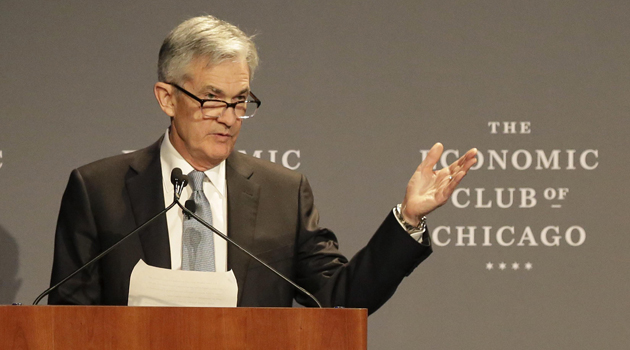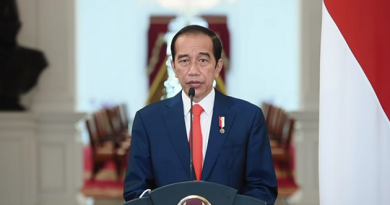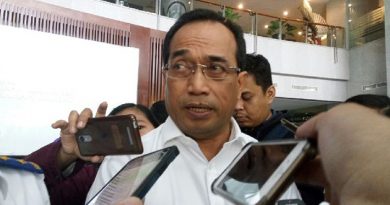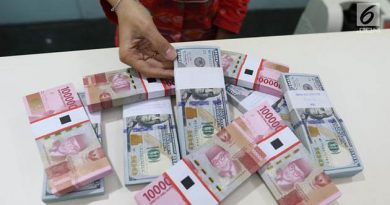Fed Chair Jerome Powell Says Trade Policies Complicate Economic Outlook
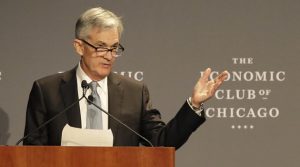
Federal Reserve Chairman Jerome Powell said a strong economy should allow the central bank to keep raising interest rates gradually and it was premature to judge how recent trade policy actions could alter those plans.
Mr. Powell spoke in an interview on the Marketplace radio program set to air Thursday evening. He is scheduled to testify on Capitol Hill next week in semiannual congressional hearings.
“I sleep pretty well on the economy right now,” Mr. Powell said in the interview, according to a transcript posted online Thursday afternoon.
Mr. Powell pointed to considerable uncertainty around the range of possible economic effects of recent trade measures and how they might influence the Fed’s plans for raising short-term interest rates.
“We don’t know. It’s very hard to sit here today and say which way that’s going,” he said.
If the Trump administration is successful over time in lowering trade tariffs, “then that’ll be a good thing for our economy,” Mr. Powell said. “If it works out other ways, so that we wind up having high tariffs on a lot of products … and that they become sustained for a long period of time, then yes, that could be a negative for our economy.”
In his most direct comments on the issue to date, Mr. Powell highlighted a worse-case scenario, of sorts, for the Fed. “You can imagine situations which would be very challenging, where inflation is going up and the economy is weakening,” he said.
The Trump administration on Tuesday announced a third round of tariffs on $200 billion of Chinese products, which could provoke new retaliation from Beijing. The administration has also imposed tariffs on imported steel and aluminum from the European Union, Canada and Mexico, leading those countries to set their own tariffs on U.S. exports.
Mr. Powell has largely refrained from commenting on trade policy because he has said it isn’t part of the Fed’s responsibilities. “When we don’t make policy, we don’t praise it; we don’t criticize it,” he said Thursday, explaining his hands-off approach.
Strong economic growth, low unemployment and stable price pressures have made it easier for Fed officials to agree on a policy of gradually lifting rates to a level they consider neutral, meaning they will seek to neither spur nor slow growth.
The Fed has raised its benchmark federal-funds rate twice this year, most recently in June to a range between 1.75% and 2%, and officials last month penciled in two more rate increases this year and three more next year.
While estimates of the so-called neutral level vary, most officials believe it is around 2.75% or 3%. If the Fed sticks to its anticipated policy path, the rate could reach its estimated neutral level by next spring or summer.
The Fed’s mandate from Congress is to maximize sustainable employment and ensure prices are stable, which the central bank defines as meeting a 2% inflation target.
The Fed is closer to meeting those goals than at any point in the past decade. Consumer prices in May rose 2.3% from a year earlier. Excluding volatile food and energy categories, they rose 2%, according to the Fed’s preferred inflation gauge.
“We’re really close to our target. I wouldn’t say we’ve fully achieved it yet,” Mr. Powell said.
Fed chairs have traditionally done such on-the-record interviews only sparingly, and Thursday’s appearance offers the latest example of Mr. Powell’s desire to demystify what the central bank is doing and why.
Alan Greenspan, for example, did just one television interview, on NBC’s “Meet the Press” in 1987, a few months into his 19-year term as chairman. He never did another such appearance as Fed chairman. His successor, Ben Bernanke, spoke to CBS’s 60 Minutes in 2009 and 2010 and to ABC News in 2012.
Mr. Powell, who began a four-year term as chairman in February, said last month he would double the frequency of his regular news conferences next year. He will take questions from the media after every meeting of the Fed’s rate-setting committee, rather than at every other meeting.
Mr. Powell also has expressed a desire to speak more casually about the economy, which reflects his nonacademic background. “It would be harder” to explain things more clearly to the public, he said Thursday, if he had spent “30 years, for example, teaching economics to graduate students.”
He described the latest communication changes as part of a long-running push toward transparency at the central bank that began under Mr. Greenspan. “I’m just carrying that forward in my own particular way,” he said.
Later, when Mr. Powell said he couldn’t easily explain why wages haven’t been rising more given complaints from employers about labor shortages, he brushed aside concern that he might not know the answer, revealing uneasiness with the perception of an omniscient central bank chief.
Radio host Kai Ryssdal said the response was “a little troubling, if you’re the guy running the economy.”
Mr. Powell responded, “I don’t think of myself as the guy running the economy.”
courtesy : wsj.com
photo : The Spokesman-Review
[social_warfare buttons = “Facebook, Pinterest, LinkedIn, Twitter, Total”]
